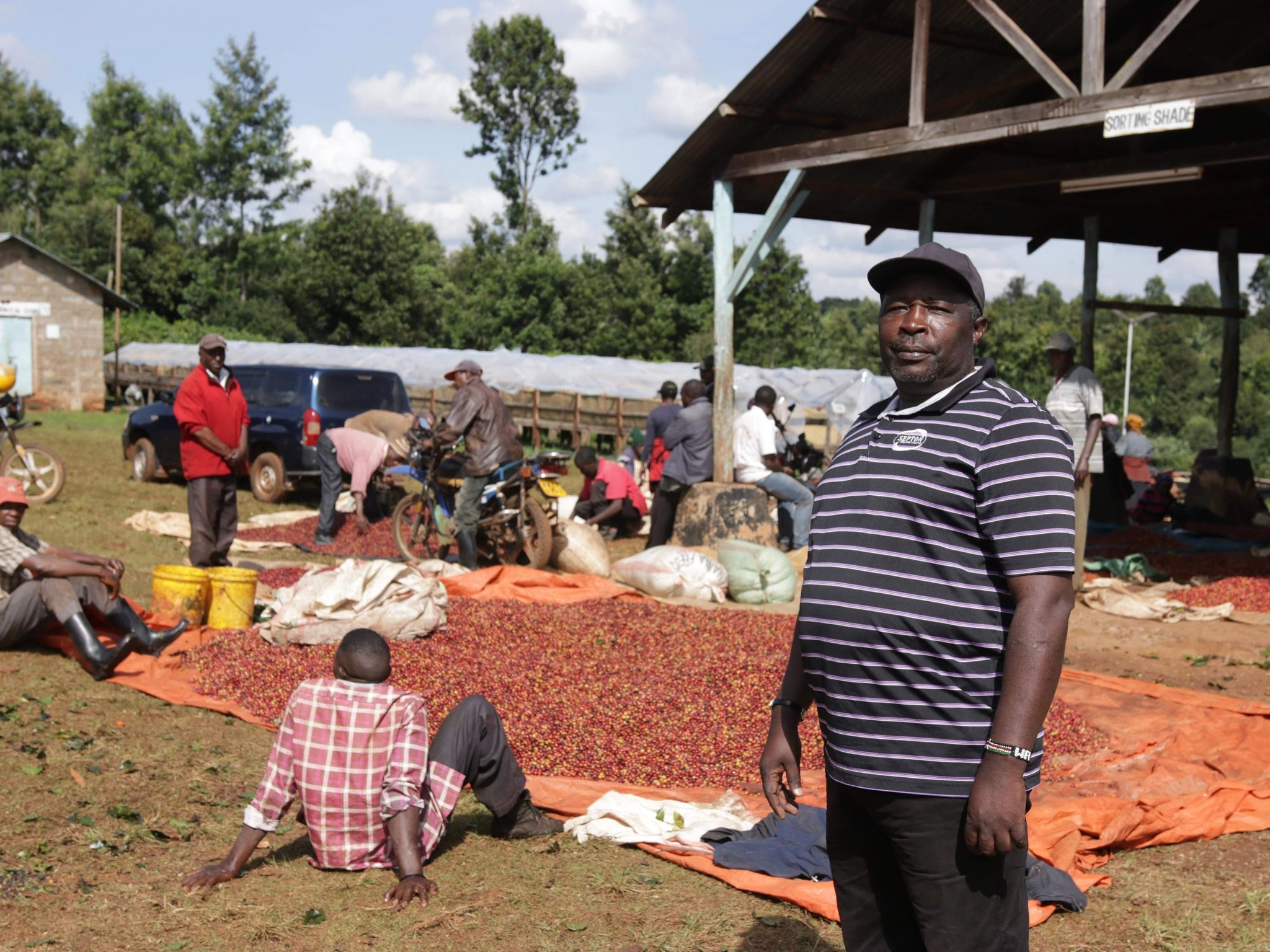
AB KARIMIKUI / KENYA
AB Karimikui / Kenya
Flavor Profile:
Complex flavours with typical Kenyan fruit and apricot, such as blackcurrant and cranberry.
Soft sweetness like rosehip and peach tea with a gorgeous finish.
Refinery /Factory Name : Karimikui Factory
Cooperative / Cooperative : Rungeto Farmers Cooperative Society
Producer / Producer : 600 small holders
Origin / Region : Kirinyaga
Country of Origin / Country : Kenya
Variety : SL-34, SL-28, Ruiru 11, Batian
Purification method / Process : Fully washed
Altitude / Altitude : 1650ml masl
Harvest : 2021-2022
This is the second Kenyan release of 2022.
AB Karimikui has a distinctly Kenyan fruitiness, such as blackcurrant, and the flavours we associate with fine Kenya.
You will find freshness, strong fruit and classic Kenyan terroir.
Kenya is often associated with strong acidity, but AB Karimikui is a gorgeous, sweet coffee with a clean, moderate acidity.
It also has a complex flavour profile, with a variety of flavours from the moment it enters the mouth until it is swallowed.
Like the previously released AA Kianderi and many other Kenyan coffees, this coffee is made by collecting and sorting cherries from small producers who grow coffee around the washing stations.
Varieties such as SL-34, SL-28, Ruiru11 and Batian are the main components, but the variety of coffees from around 600 growers is one of the factors that give this coffee its complexity.

Karimikui Factory is a factory established in 1966.
It is now part of the Runghet FCS, and many of the small producers in the region grow tea rather than coffee.
The rich red volcanic soil is suitable for coffee cultivation, with temperatures ranging from 13°C to 24°C throughout the year.
In this environment, coffee cherries ripen slowly, forming fine acidity and aroma.
There are two rainy seasons: long rains from March to May and short rains from October to December.
Farmers in the region grow mainly SL28 and SL34, which account for 99% of total production. Occasionally, some growers grow small quantities of Ruiru 11.

In Kenya, coffee producers are surrounded by several different factories and are free to choose where to deliver their cherries.
Therefore, in order to collect high quality cherries from a large number of producers, the factories also need to offer attractive conditions to the producers.
If they are able to produce high quality coffee and sell it at a high price, they can pay a second reward to the grower from the profit made, minus the costs of sales and production. In some proven factories, as much as 85% or more of the selling price can be returned to the producer.
Producers choose the factory that buys their cherries on better terms, so the factory also controls the production of high quality coffee with strict standards, from refining to sales.

When the grower arrives at the collection point (collection area), bags are usually emptied on the floor (on top of the cover) and unripe cherries, overripe cherries and cherries infected with CBD (a disease caused by a fungus) are removed.
The responsible person then inspects the cherries for quality before weighing them and the producer receives an advance payment, which is part of his remuneration.
Delivery information is recorded from each producer and a receipt is issued for the amount paid in advance.
This serves as proof of entitlement to payment after the coffee has been sold.
After the cherries have been weighed, they are placed in the main cherry hopper above the pulper (a machine used to remove the pulp from the cherries).
When the pulper is activated, the cherries are moved by gravity into the machine.
Through the machine, the cherries flow out of the discs with water as pulp-removed parchment.
The parchment can be separated by density in the water.
The densest beans sink and go straight through the channel to the fermentation tank as P1 (parchment 1), while the semi-dense beans are sent to another fermentation tank as P2.
The floating material, P3, is considered low grade and is usually sent straight to the drying table.
The denser coffee is then dry fermented (fermented without water) in painted concrete tanks.
It is usually fermented for 18-24 hours.
In many factories, water is added every 6-8 hours to stir and clean the parchment, which is then drained again.
After fermentation in the tanks, the coffee is skin-dried on hessian mesh matting for one day.
This is to quickly remove any water from the surface of the parchment.
A day later, the coffee is then transferred to a traditional drying table, usually on a wire mesh with a hemp cloth or shade net over it.
During the hottest part of the day, between 12pm and 2am, and at night, the coffee must be covered with plastic.
Drying takes from 12 to 20 days, depending on the weather and rainfall, to reach the moisture target of 11-12%.
Click on the link below to purchase!
→ AB Karimikui / Kenya🇰🇪
AB Karimikui tasting video on YouTube!
Click here for more videos!



